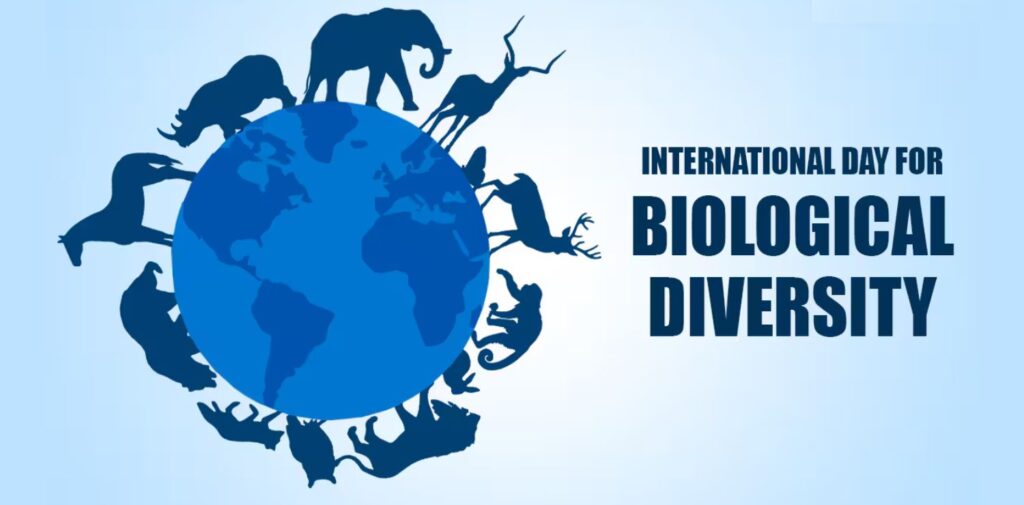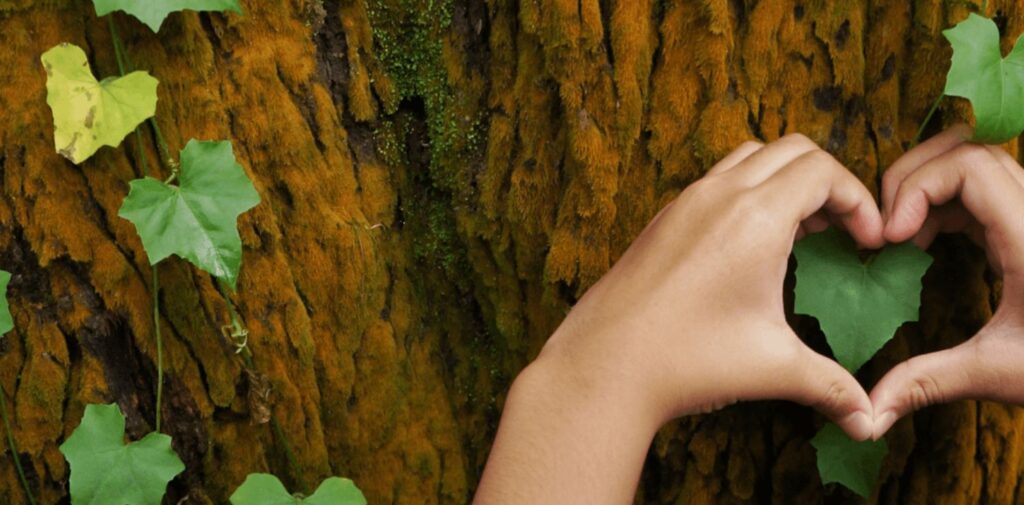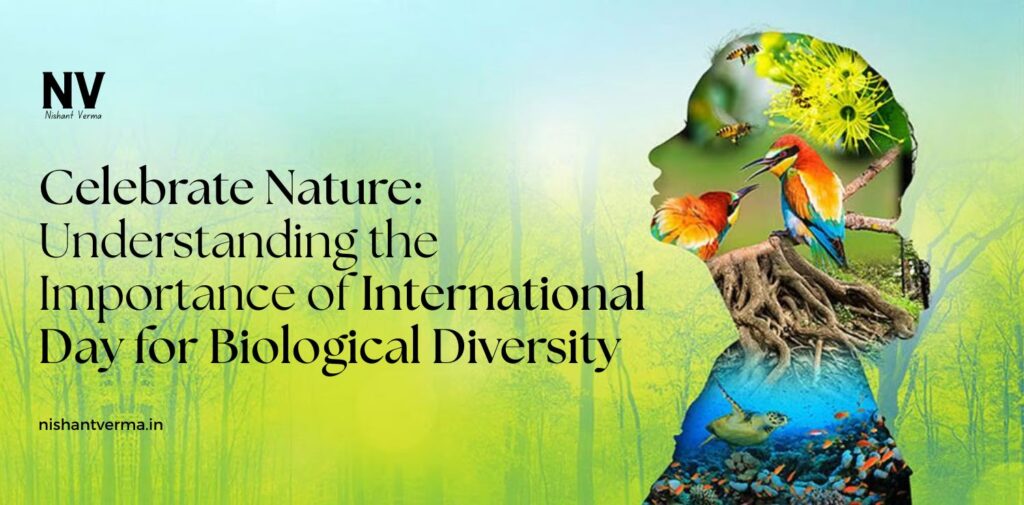Every year, on the 22nd May, the world comes together to observe the International Day for Biological Diversity. This special day is dedicated to celebrating the rich variety of life on Earth – from tiny insects to large animals, from lush forests to deep oceans. In a country like India, known for its incredible natural diversity, this day holds even greater importance. With different types of plants, animals, birds, and ecosystems, India is one of the richest countries in terms of biodiversity.
International Day for Biological Diversity is not just about plants and animals, it is about our survival, culture, economy, and the balance of life. In simple words, biodiversity is the variety of life forms in a particular area – including humans, animals, plants, microorganisms, and their environment. Each living being, whether big or small, plays an important role in keeping our Earth healthy and balanced.
Let’s explore more about this important day and understand why it matters so much, especially for India.
Why is biodiversity important for us?
Biodiversity is like a web of life. Every living creature has a role to play in maintaining this web. The air we breathe, the food we eat, the water we drink – all come from nature. The trees clean the air, the rivers and lakes provide drinking water, and insects like bees help in pollination, which helps plants grow fruits and vegetables. Even tiny soil bacteria help grow healthy crops.
In India, millions of people depend directly on biodiversity for their daily lives. Farmers depend on natural fertilizers and healthy soils. Fishermen depend on clean rivers and oceans. Tribals and rural communities depend on forests for food, medicine, and shelter. Our traditional medicines like Ayurveda also use various herbs and plants found in forests. Without biodiversity, many of these systems would collapse.
Also, many of our festivals, traditions, and rituals are closely connected with nature. For example, worshipping trees like Peepal and Tulsi, or animals like cows and snakes, shows our deep connection with biodiversity.

India’s rich biodiversity and what we must protect
India is among the 17 mega-diverse countries of the world. It has almost 8% of the world’s recorded species. From the Himalayas in the north to the Western Ghats in the south, from the Thar Desert in the west to the Sundarbans in the east, each region of India has its own unique plants and animals.
India has:
- Over 47,000 species of plants
- Around 90,000 species of animals
- Rich forest covers, including mangroves and tropical rainforests
- Wetlands, coral reefs, rivers, and mountains that support unique life forms
Some of the animals found in India like the Royal Bengal Tiger, Indian Elephant, Asiatic Lion, and One-horned Rhinoceros are not found in many other parts of the world. These animals are not only important for the ecosystem but are also part of our culture and identity.
However, many of these species are in danger. Due to deforestation, pollution, overfishing, climate change, and urbanisation, many plants and animals are losing their homes. Several species in India are now endangered or have already become extinct.

What is the role of International Day for Biological Diversity?
This day was first declared by the United Nations to increase awareness and action for the protection of biodiversity. The goal is to make people, especially young generations, understand the value of nature and why it needs our care.
Each year, the day is celebrated with a special theme. These themes focus on various aspects such as ecosystem restoration, sustainable living, or indigenous knowledge. Schools, colleges, environmental groups, and government departments organize events like tree plantations, awareness walks, drawing competitions, seminars, and campaigns.
In India, this day is also used to bring together scientists, policymakers, farmers, and local communities to discuss ideas and actions to protect biodiversity. It encourages everyone – from students to senior citizens – to play a role in conservation.
Simple ways we can protect biodiversity in daily life
You do not need to be a scientist or a forest officer to protect biodiversity. Small actions by each one of us can make a big difference. Here are some simple steps that we can take in our daily lives:
- Plant native trees and protect green spaces in your area
- Use cloth bags instead of plastic bags to reduce pollution
- Avoid wasting food and water, as they come from natural resources
- Recycle and reuse materials to reduce pressure on nature
- Avoid using harmful chemicals and pesticides at home or in gardens
- Do not buy products made from endangered animals or rare woods
- Support local and organic farmers who use eco-friendly methods
- Educate children and others about the importance of biodiversity
Even simple acts like feeding birds, creating small gardens in balconies, or saving frogs and insects from being killed unnecessarily can make a difference.
How India is taking steps to protect biodiversity
India has made many efforts to conserve biodiversity. The government has set up national parks, wildlife sanctuaries, and biosphere reserves to protect important habitats. There are laws like the Wildlife Protection Act and the Forest Conservation Act that help in safeguarding animals and forests.
India is also promoting traditional farming methods and organic farming. Indigenous communities, especially in North East India and central tribal belts, are known for their nature-friendly ways of living. These communities use their knowledge of plants and animals in a sustainable manner, which is now being recognised as very valuable.
Various NGOs, environmentalists, and youth groups in India are actively working to protect nature. From cleaning rivers to rescuing animals to running awareness programs, they are doing amazing work. With increasing awareness, even urban citizens are becoming more conscious about the environment.

Why we must act now, not later
Biodiversity loss is not just an environmental issue – it is also a social and economic issue. If we lose our forests, our water sources will dry up. If we lose bees, our crops will suffer. If we lose fish, coastal communities will lose their livelihood. Climate change is making these problems worse. Droughts, floods, and heatwaves are becoming more common and affecting both nature and people.
By acting today, we can ensure a better future for ourselves and our children. Protecting biodiversity is not a one-day activity. International Day for Biological Diversity is a reminder that we must care for nature every day.
It’s not just about saving tigers or forests – it’s about saving our future.
Let’s take inspiration from our rich Indian culture which teaches us to live in harmony with nature. Let’s come together as responsible citizens to protect our biodiversity. Because once it’s gone, we cannot bring it back.
So this 22nd May, let’s not just celebrate the International Day for Biological Diversity – let’s commit to it.
Every step counts. Every voice matters. And together, we can make a greener, healthier, and more beautiful India.




